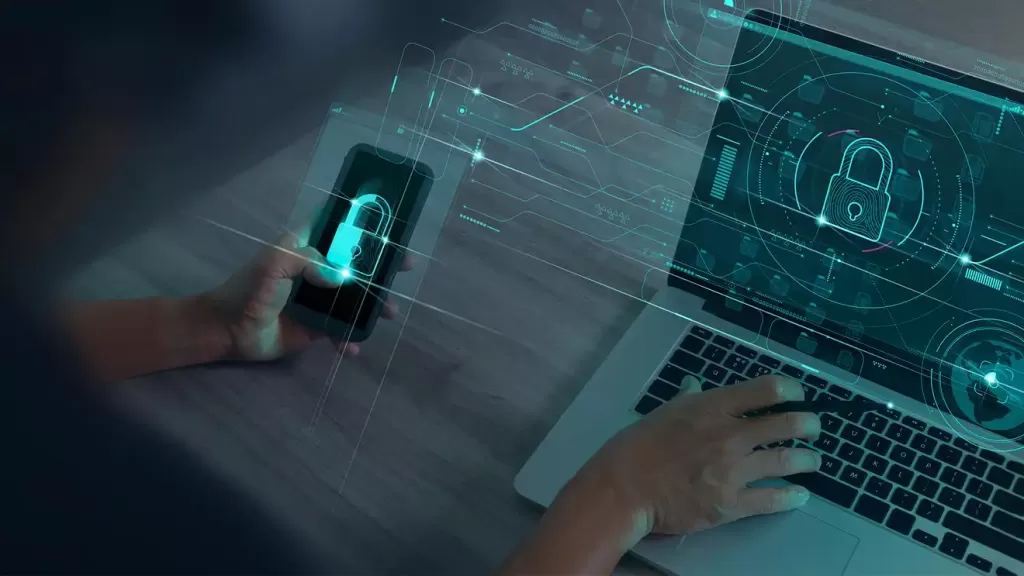Written By:
Scott McAuley
Scott is the IT Director of Texas Management Group, and has been in the IT industry for 25 years.
Cybersecurity is a rapidly growing field, with endless opportunities for those willing to dive in. If you’re eager to protect systems and data but don’t have a formal background, don’t worry—you can still succeed.
Many professionals have mastered how to learn cybersecurity on their own, proving that a self-taught path can lead to success.
But where do you start? Learning cybersecurity on your own can be overwhelming without a clear direction. That’s why a solid plan is key.
In this guide, we’ll walk you through six essential tips that will help you stay focused and confident on your journey.
Let’s jump in and discover the best ways to get started!
Key Takeaways
- Identify transferable skills you already have, such as coding or network administration, to build a strong foundation in cybersecurity.
- Start with the basics of cybersecurity, focusing on encryption, firewalls, and common threats like malware, phishing, and network security.
- Leverage online courses and bootcamps, such as Coursera or Springboard, for structured learning and hands-on experience in cybersecurity.
- Choose a cybersecurity specialty, like application security or penetration testing, to focus your efforts and develop expertise in a specific area.
- Get certified with recognized credentials, like CompTIA Security+ or Certified Ethical Hacker (CEH), to enhance credibility and job prospects.
Table of Contents
How to Learn Cybersecurity: 6 Tips for Self-Taught Success

Cybersecurity is an essential skill in today’s digital world, and learning it can be manageable with the right approach.
Follow these 6 steps to build your knowledge and expertise:
1. Identify Transferable Skills
Start by leveraging skills you already have. These can give you a strong foundation in cybersecurity:
- Coding: Experience in languages like Python, JavaScript, and SQL helps in understanding malware, developing security scripts, or finding vulnerabilities.
- Data Analysis: Analytical skills are useful in threat intelligence, detecting patterns, and analyzing breaches.
- Network Administration: Knowledge of network setup helps you understand how attacks propagate and how to secure them.
- System Administration: Experience managing operating systems gives insight into endpoint security and defending against attacks.
- Digital Forensics: If you’ve worked in digital forensics, you’re well-equipped to investigate cybercrimes and analyze breaches.
2. Start With the Basics
Build a solid foundation by learning key cybersecurity concepts:
- Encryption & Firewalls: Understand how encryption protects data and how firewalls block unauthorized access.
- Common Threats: Study malware, phishing, and ransomware to recognize and defend against them.
- Network Security: Learn about firewalls, VPNs, intrusion detection systems (IDS), and how they protect networks.
- Cybersecurity Laws: Familiarize yourself with relevant laws like FISMA and GDPR to understand the legal side of cybersecurity.
3. Take a Course
Accelerate your learning by enrolling in cybersecurity courses:
- Springboard: Offers a 6-month bootcamp with job guarantees, covering all essential topics.
- edX: Provides beginner to advanced courses, including programs from MIT and NYU.
- Coursera: Explore over 80 cybersecurity courses, ranging from introductory levels to advanced specialties.
- Udemy: Offers affordable courses taught by industry experts, ideal for beginners.
- Bootcamps: Consider immersive, short-term bootcamps for hands-on learning and real-world experience.
4. Find a Specialty
Narrow your focus by choosing a cybersecurity specialty:
- Application Security: Ensure software and applications are secure by working with developers to minimize vulnerabilities.
- Network Security: Focus on protecting networks from intrusions using firewalls, IDS, and secure configurations.
- Penetration Testing: Become a “white hat” hacker by finding security flaws in systems before malicious hackers do.
- Cloud Security: Protect data and applications hosted in cloud environments, a growing area of focus.
- Information Security: Protect organizational data through risk management and compliance with security standards.
5. Get a Certification
Boost your credibility by earning cybersecurity certifications:
- CompTIA Security+: A foundational certification that proves you understand core cybersecurity principles.
- Certified Ethical Hacker (CEH): Validates your skills in penetration testing and ethical hacking.
- Certified Information Systems Security Professional (CISSP): An advanced certification for roles like security manager or IT auditor.
- Cisco Certified CyberOps Associate: Focuses on security operations centers (SOCs) and threat detection.
6. Enter Contests or Get Feedback
Gain hands-on experience through contests and feedback:
- Cybersecurity Contests: Enter challenges like Capture the Flag (CTF) or Cyber Quests to test your skills in real-world scenarios.
- VulnHub: Use virtual labs to practice vulnerability testing in a controlled environment.
- Feedback from Mentors: Seek advice from mentors or professionals to identify areas of improvement and refine your skills.
- Global Cyberlympics: Participate in international competitions that focus on ethical hacking, digital forensics, and network security.
A Career in Cybersecurity: Where to Start
Cybersecurity is a growing field with many opportunities. Whether you’re starting from scratch or already have some relevant skills, here’s how to begin your journey.
If You Know Nothing
1. Set clear learning goals
Decide what you want to learn and set a timeline. For example, aim to learn penetration testing basics within three months.
2. Break down the skills you need
Cybersecurity involves different areas, so break it down:
- Networking: Learn how networks work and how to secure them.
- Encryption: Understand how data is protected.
- Hacking: Study common hacking techniques and how to defend against them.
3. Take a course or bootcamp
Enroll in courses or bootcamps to speed up your learning. Platforms like Coursera, Cybrary, and Springboard offer beginner-friendly courses that cover the basics and give you hands-on experience.
4. Identify learning barriers
If certain concepts are difficult, find a mentor or use additional resources. Break complex topics into smaller parts to make learning easier.
5. Commit to daily learning
Set aside at least two hours each day to study and practice. Use resources like tutorials, forums, and blogs to stay engaged and motivated.
6. Track your progress
Document what you learn to keep track of your growth. This will help you see how far you’ve come and identify areas for improvement.
7. Test your skills
Take quizzes and practice in virtual labs like VulnHub to apply what you’ve learned. Testing yourself ensures you’re ready for real-world challenges.
Related Background or Skill Set
1. Leverage your existing skills
If you have IT, programming, or data analysis experience, use it to jumpstart your cybersecurity career:
- Programming (Python, SQL): Write scripts and detect vulnerabilities.
- Data Analysis: Analyze patterns in cyberattacks to predict future threats.
- Network Administration: Secure systems by applying your network management skills.
2. Choose a cybersecurity specialty
Focus on an area that interests you and matches your skills:
- Application Security: Ensure software is secure and free from vulnerabilities.
- Network Security: Protect networks from cyber threats like unauthorized access.
- Penetration Testing: Find and fix system vulnerabilities before attackers exploit them.
3. Get certified
Certifications will boost your credibility. Start with:
- CompTIA Security+: Ideal for beginners.
- Certified Ethical Hacker (CEH): Focused on penetration testing.
- CISSP: Advanced certification for experienced professionals.
4. Attend conferences and network
Join industry events like DEF CON and Black Hat to connect with professionals and stay up to date with the latest trends.
5. Read cybersecurity journals and blogs
Stay informed by reading publications like the Journal of Cybersecurity and blogs like Krebs on Security to keep up with industry trends.
8 Resources to Help You Learn Cybersecurity from Scratch
Starting a career in cybersecurity can be challenging, but there are many useful resources to help you get started from scratch.
Here are the 8 resources to help you learn cybersecurity from scratch:
| Resource | Description |
|---|---|
| Online courses | Platforms like Coursera, edX, and Udemy offer structured courses on network security and hacking. |
| Certifications | Start with CompTIA Security+ or CEH to validate your skills and improve job prospects. |
| Bootcamps | Intensive programs like Springboard and Flatiron School provide hands-on training and mentorship. |
| TED talks & podcasts | Watch talks like “The Era of Cyberwarfare” or listen to Security Now for expert insights. |
| Webinars | NinjaRMM and CyberSecure My Business host webinars on relevant cybersecurity topics. |
| Books | “Hacking: The Art of Exploitation” and “The Web Application Hacker’s Handbook” offer deep insights. |
| Online communities | Reddit’s NetSec and HackerOne provide forums to discuss tools and cybersecurity trends. |
| Practice platforms | VulnHub and Hack The Box offer environments to practice penetration testing and solve challenges. |
1. Online Courses
Online courses are an excellent place to start. Platforms like Coursera, edX, and Udemy offer beginner-friendly courses on network security, ethical hacking, and other key cybersecurity topics.
These courses provide a structured approach and often include hands-on labs.
2. Certifications
Certifications are crucial for proving your skills to employers. The CompTIA Security+ certification is ideal for beginners. It covers core topics like network security, threats, and risk management, and is widely recognized in the industry.
3. Bootcamps
Cybersecurity bootcamps provide intensive, hands-on training. Programs like Springboard and Flatiron School are designed to take you from beginner to job-ready in a few months. These bootcamps focus on practical skills and real-world projects.
4. TED Talks and Podcasts
If you prefer learning through audio or video, TED talks and podcasts are great resources. Talks like “The Era of Cyberwarfare” by Keren Elazari are short and provide valuable insights into modern cybersecurity challenges.
Podcasts like Security Now, hosted by Steve Gibson and Leo Laporte, provide insights into cybersecurity trends and practical advice. You can listen on platforms like Apple Podcasts and Spotify.
5. Webinars
Webinars offer interactive learning from industry professionals. NinjaRMM offers webinars on current cybersecurity topics, while CyberSecure My Business provides webinars focused on helping small businesses stay cyber-safe.
6. Books
Books are another excellent way to deepen your understanding of cybersecurity. “Hacking: The Art of Exploitation” by Jon Erickson is a great choice for beginners, covering hacking fundamentals and network security.
For web security, “The Web Application Hacker’s Handbook” by Dafydd Stuttard and Marcus Pinto teaches how to identify and fix vulnerabilities in web applications.
7. Online Communities
Joining online communities can help you learn faster and network with others. Reddit’s NetSec and HackerOne are popular forums where cybersecurity professionals and beginners share tools, tips, and challenges.
8. Practice Platforms
Practical experience is essential in cybersecurity. Platforms like VulnHub and Hack The Box offer virtual environments where you can practice penetration testing and solving security challenges.
You can also join Capture the Flag (CTF) competitions to test your skills. These events simulate real-world cybersecurity challenges, helping you build experience in identifying vulnerabilities.
Conclusion
Learning cybersecurity on your own is entirely achievable with the right mindset and resources. By following these six essential tips, you can build a solid foundation and steadily advance your skills.
Focus on leveraging existing knowledge, exploring online courses, and gaining hands-on experience to stay on track. Certifications will help validate your expertise, while contests and practice labs allow you to refine your skills.
Ready to take the next step in your cybersecurity journey? Dive into these strategies, stay committed, and watch your skills grow. The opportunities in this field are endless—so don’t hesitate to start your self-taught path today!
Ready to Master Cybersecurity on Your Own?
Explore our blogs for in-depth guides and expert tips that will accelerate your learning journey.
When you’re ready to take your skills to the next level, see how our managed cybersecurity services provide hands-on experience and real-world knowledge to help you thrive in the field.
Start your path to cybersecurity success—contact us today for personalized support!
FAQ
What Online Resources are Recommended for Learning Cybersecurity?
Websites like Cybrary, Udemy, and Coursera offer comprehensive cybersecurity courses and tutorials.
How Can I Build Practical Skills in Cybersecurity Without Formal Education?
You can practice through online labs, capture-the-flag challenges, and setting up your own test environments.
What Certifications Should Self-Taught Cybersecurity Professionals Consider?
Certifications like CompTIA Security+, Certified Ethical Hacker (CEH), and CISSP are valuable for self-taught professionals.
How Can Networking With Industry Professionals Benefit my Cybersecurity Learning Journey?
Networking provides mentorship, job opportunities, and insights into the latest industry trends and practices.






